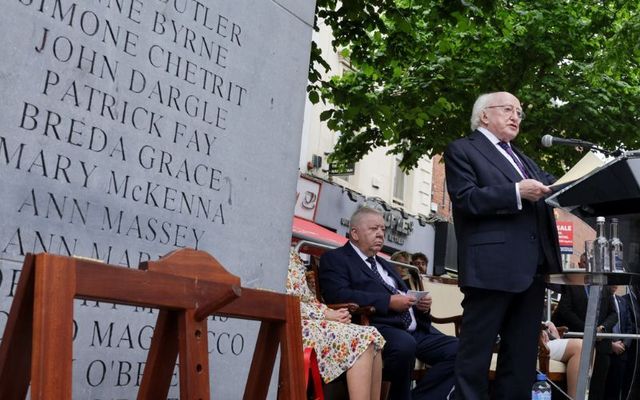President of Ireland Michael D. Higgins said that relatives of the 34 people killed in the Dublin and Monaghan bombings in 1974 "deserve the truth" and that there was "manifest failure" from the British and Irish Governments to adequately respond to the bombings.
More than 300 people were injured during the Dublin and Monaghan bombings, which killed 34 people, including an unborn baby. It represents the greatest loss of life on a single day during The Troubles.
Three bombs exploded almost simultaneously in Dublin on Talbot Street, South Leinster Street, and Parnell Street at 5:30 pm on May 17, 1974, while a fourth bomb exploded at Heaton's Corner in Monaghan Town at around 7 pm.
No one has ever been charged in connection with the bombings, but the Ulster Volunteer Force (UVF) admitted responsibility in 1993. There have also been persistent allegations of collusion between the UVF and British security and intelligence services to carry out the attacks.
On Friday, President Higgins laid a wreath at a memorial to the victims on Talbot Street to mark the 50th anniversary of the attack. Taoiseach Simon Harris, Tánaiste Micheál Martin, and former Taoisigh Leo Varadkar and Bertie Ahern also attended Friday's memorial.
Friday's event was led by Aidan Shields, whose mother Maureen died in the bombings 50 years ago. Family and friends of victims laid wreaths and flowers at the memorial on Talbot Street, while survivor Bernie McNally read out the names of all 34 victims.
Higgins told those gathered at Friday's event that he shares with relatives the feeling of being "abandoned and failed by the system, of their being denied justice for the loss of loved ones."
Higgins added that relatives and survivors deserve "more than an empathetic ear," stating that "justice demands that they deserve the truth, no more, no less."
The President also addressed the British Government's controversial Troubles Legacy Act, which aims to grant conditional amnesty to people suspected of crimes committed during the Troubles. The act has introduced a ban on inquests and future civil actions related to the Troubles era.
Speaking on Friday, Higgins said it is "not morally acceptable, nor is it politically feasible" to ask those impacted by the Troubles to forget about the past.
"The enactment of that unilaterally sourced legislation has resulted in families who have spent decades fighting for an effective investigation into their cases of not only facing further uncertainty and delays but of the deprivation of legal rights," Higgins said on Friday.
"We share, on this island and beyond, a collective responsibility to find a way to deal ethically with the legacy of the Troubles.
"A strategy of feigned amnesia, or hoping time will deliver one is simply not an option, nor is any strategy of continuing the protection of previous evasions or failures to act.
"Momentous anniversaries of terrible atrocities, such as this most significant one we are marking together today, a full half-century on, are salutary reminders of the urgent need to find an ethical and comprehensive way to deal with the legacy of the Troubles in their totality."
Also on Friday, Minister for Justice Helen McEntee said the Irish Government would continue to pursue all possible avenues to uncover the truth behind the bombings.
"The survivors and the families of the victims remain firm in their quest for justice and for information about what happened to their loved ones. The Government is fully committed to seeking out the truth behind those events and, hopefully, to secure some measure of comfort for the victims’ families and the survivors," McEntee said.
Earlier on Friday, a memorial mass took place at Dublin's Pro Cathedral. The commemorative events were organized by Justice for the Forgotten, a group campaigning for justice for the victims of the bombings and other Troubles-era atrocities.




Comments